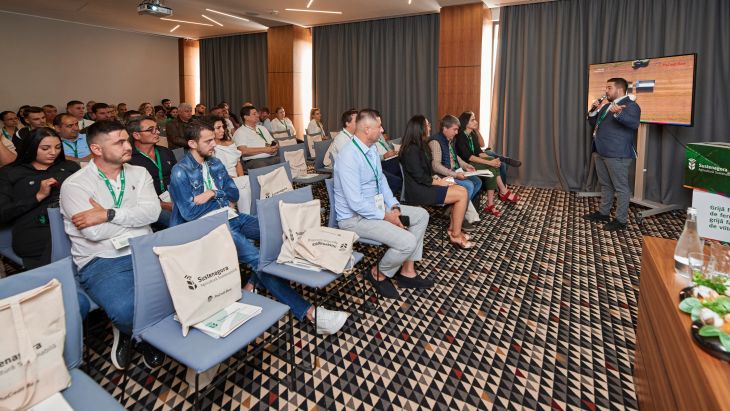ProCredit Bank successfully organised the first edition of the conference “Sustenagora: Sustainable Agriculture”, which brought together more than 50 farmers interested in sustainable agriculture methods and practices. The event took place in the south-east of the country, in Constanța county, a region that is experiencing low soil moisture levels, with a lack of rainfall having a considerable negative impact on harvests in recent years.
The aim of the conference was to stimulate collaboration and exchange of experience between participants, thus encouraging the implementation of real solutions to today’s climate problems. Speakers at the event included experts and consultants in sustainable integrated agriculture, such as Patrick Valmary, a pioneer in the field with 30 years of experience in the agricultural sector in Romania and France, and Cristiana Necula, an agronomist who practices sustainability principles on her own farm.
Sustenagora: Sustainable agriculture, opportunities for Romanian farmers
The first panel served as an introduction to the topic of sustainable agriculture, bringing into focus the current context and opportunities present in this sector. The second panel focused on practical discussions on the topic of agricultural technology for sustainable farms. Both sessions encouraged open dialogue and questions from the audience, thus providing the experience of a real forum, where issues such as communication and finding the right solutions for each farm are pursued.
As an organiser, ProCredit Bank focused primarily on bringing value to its community of clients and collaborators through useful information and facilitating the exchange of practical experiences.
“ProCredit Bank, as a financier, is firmly committed to the development of sustainable agriculture in Romania, being aware of the impact of the agricultural sector both for the economy and the environment. For over 20 years we have been providing financing and financial solutions tailored to the specific needs of this crucial sector and we are actively involved in understanding every challenge farmers face. With a representative portfolio dedicated to the agricultural sector, ProCredit Bank assumes a significant responsibility in supporting agricultural communities and farmers” says Valentina Neagoe, Head of Legal Clients ProCredit Bank Romania.
ProCredit Bank, promoter of sustainable agriculture
ProCredit Bank is working hard to raise awareness about climate change and the environmental impacts of economic activities. Alexandra Floricică, Head of Green Energy ProCredit Bank Romania, says: “In a context of increasing climate change, where Romania has suffered monetary losses of around €14 billion between 1980-2020, the agricultural sector becomes critical to ensure economic stability and meet the food needs of the population. It is important to adopt and promote sustainable agricultural practices, which not only maintain the balance of ecosystems, but also contribute to reducing carbon emissions and adapting to climate conditions. Sustenagora: Sustainable Agriculture is a forum for farmers and agricultural experts, where we aim to discuss and learn about best practices and innovations, applicable to each region of the country,” continued Alexandra Floricică.
After the success of the conference in Constanta, “Sustenagora: Sustainable Agriculture” returns with its second edition, this time dedicated to farmers in the west of the country. As in the first edition, the participants will be farmers and collaborators from the ProCredit Bank community.
The conference series is designed to provide participants with an additional benefit of working with ProCredit Bank in a small circle that allows for open dialogue.
About ProCredit Bank
ProCredit Bank Romania is part of the growth-oriented ProCredit Group of commercial banks for small and medium-sized enterprises (SMEs). ProCredit Holding AG, based in Frankfurt am Main, Germany, is the parent company of the growth-oriented ProCredit Group, which consists of commercial banks for small and medium-sized enterprises (SMEs).
